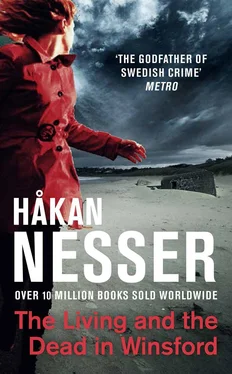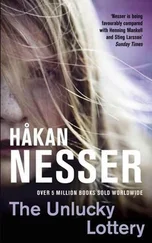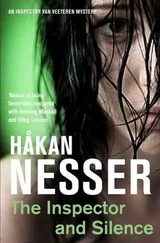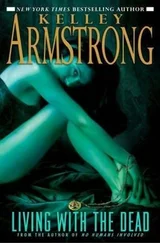Håkan Nesser - The Living and the Dead in Winsford
Здесь есть возможность читать онлайн «Håkan Nesser - The Living and the Dead in Winsford» весь текст электронной книги совершенно бесплатно (целиком полную версию без сокращений). В некоторых случаях можно слушать аудио, скачать через торрент в формате fb2 и присутствует краткое содержание. Год выпуска: 2013, Издательство: Mantle, Жанр: Криминальный детектив, на английском языке. Описание произведения, (предисловие) а так же отзывы посетителей доступны на портале библиотеки ЛибКат.
- Название:The Living and the Dead in Winsford
- Автор:
- Издательство:Mantle
- Жанр:
- Год:2013
- ISBN:нет данных
- Рейтинг книги:4 / 5. Голосов: 1
-
Избранное:Добавить в избранное
- Отзывы:
-
Ваша оценка:
- 80
- 1
- 2
- 3
- 4
- 5
The Living and the Dead in Winsford: краткое содержание, описание и аннотация
Предлагаем к чтению аннотацию, описание, краткое содержание или предисловие (зависит от того, что написал сам автор книги «The Living and the Dead in Winsford»). Если вы не нашли необходимую информацию о книге — напишите в комментариях, мы постараемся отыскать её.
The Living and the Dead in Winsford — читать онлайн бесплатно полную книгу (весь текст) целиком
Ниже представлен текст книги, разбитый по страницам. Система сохранения места последней прочитанной страницы, позволяет с удобством читать онлайн бесплатно книгу «The Living and the Dead in Winsford», без необходимости каждый раз заново искать на чём Вы остановились. Поставьте закладку, и сможете в любой момент перейти на страницу, на которой закончили чтение.
Интервал:
Закладка:
Gudrun nodded. ‘I know. And it passed after two weeks. Think now: have you ever cried again since then?’
I suddenly felt most unwell. There was a sort of suppressed panic inside me that was trying to break out, like an itch in a leg in plaster, and it was stuck so fast underneath that iceberg that all I could do was to grit my teeth and confirm that she was quite right.
‘Not that I can remember,’ I said.
We talked about a lot of things during those years, Gudrun Ewerts and I. About Göran, for instance, my brother, and my relationship with him. Why hadn’t we supported one another when our little sister died? she wondered. Why hadn’t the family closed ranks and mourned as a unit? Why had my mother and my father slowly succumbed, one after the other?
They were horrendous questions. Gudrun wondered if I was scared of the answers, and that was why I preferred to keep them under wraps. I said I didn’t know, and she suggested that perhaps it was the imagined answers that I was afraid of. By now I already had a considerable collection of dead bodies in my emotional baggage — but it had all begun with just one. Isn’t that the case? she asked. Isn’t that the case?
I said yes, of course it was. It had begun with Bengt-Olov the Football Star backing his bus over Gunsan in that car park, and since. . well, since something like that could happen in just a second, then. . then goodness knows what else could happen in the same way. Just as quickly and with just as little warning. You could lose your grip and fall off a cliff face, for instance. Darkness and death were lurking on all sides, she knew that as well as I did, and asking unpleasant questions simply created openings for them to force their way through.
Was that how I saw the circumstances in the lives we live? my therapist wondered. Was that why I was unable to lift up the lid and look more closely at the relationship between me and my brother, if we were to restrict ourselves to that particular question for the time being?
‘I sometimes find it more or less impossible to listen to your exaggerations,’ I recall protesting on one occasion when we were discussing such matters. ‘You are fishing in murky psychological waters. Göran and I are very different fish, and you’ll never be able to catch us using the same hook. The fact is that some siblings simply are that different.’
The imagery was nothing special, but I sometimes tried to counter-attack her in that way and Gudrun always used to smile at my faux pas.
‘I’ll tell you what I think, in order to save some time,’ she said on another occasion. ‘One shouldn’t really take this kind of shortcut in therapeutics — after all, it’s the patient who should find the answers, discover them deep down inside and all that. . But I wonder if the basic fact is simply that you loved your little sister above all else, and that after she was snatched away from you, you have never dared to love anybody else. Not in the whole of your life. You just haven’t dared to take the risk.’
‘That sounds rather banal to me,’ I said.
‘Who on earth has ever suggested that life isn’t banal?’ asked Gudrun Ewerts.
We never got very far in questions associated with my family relationships. They cropped up, we talked about them, I agreed that there could well be a fair amount of truth in her suggestions — but even if that was the case I had no idea what I could do about it now, so long afterwards. She pointed out, of course — the way therapists do — that we needed to sort out the past in order to cope with the present, and that it was essential if I was going to be able to deal rather more successfully with crises in the future. My post-natal depression was a clear sign, but I was the only one who could decide whether I was going to take it seriously or not. Surely I wasn’t so naive that I thought this was the last of the crises?
And so on. . Towards the end of our conversations, the last three or four months, we only met every other week, and Gudrun admitted that our sessions were beginning to be reminiscent of chats between old friends rather than some kind of therapy. Old friends who had different points of view on some matters, and who liked to discuss them now and again in congenial circumstances.
‘I can’t accept payment from you any longer,’ she said at our last meeting. ‘It would be unethical.’
We didn’t meet again after that. Those friends with the different points of view went their different ways, and I assume that’s the way it is as far as therapists are concerned. They meet people who have lost their footing, help them back to their feet, support them, then take the props away — it can take time, months and years, but when it’s over the patient staggers off and the therapist goes to the waiting room where other lost souls are sitting and suffering.
I could have done with Gudrun Ewerts after that business with Magdalena Svensson at the hotel in Gothenburg, I know that. But she died at the beginning of 2006; I actually attended her funeral. There were at least three hundred people in the church, and I wondered how many of them were former patients.
Anyway, I have thought quite a lot about my relationship with Göran, my elder brother: that was a button Gudrun often pressed. If siblings don’t have much in the way of contact when they are young, they are not going to have much when they are grown up: that is not exactly a contentious conclusion. And when I occasionally manage to transport myself back to my young days, to the feelings and moods that might well have possessed me at that time, they are as elusive and unreliable as feverish dreams; but if I try to penetrate them even so, all these years later, the only conclusion I can draw is that I didn’t like him. No, I didn’t love my elder brother, I really didn’t.
But that is all there was to it. There is nothing more sinister behind it, he never did me any harm, he never bullied me. He was just irrelevant to me. Presumably because I was irrelevant to him. I have no special memories of him, nothing we did together, nothing he said on a particular occasion, nothing at all. He was present more or less like those distant relatives who usually appear on the fringe of old family photographs. He was always there, he was always in the vicinity, but nothing he ever said or did or got up to is preserved in my memory. I realize that it is a bit remarkable. Perhaps it is even most remarkable, which is what Gudrun always used to say.
Anyway, nowadays he is a secondary school teacher with two children and a wife he will never leave. She might leave him, but I don’t think that will happen either. In May, when those headlines had started appearing, he telephoned me and stressed that I knew where to find him if I needed him.
He rang again when Magdalena Svensson withdrew her allegations of rape, and expressed the relief of both himself and his family.
That was a bit much.
It’s understandable that Martin and Göran have never had much to say to each other. We celebrated Christmas twice with his family when the children were small, once at our place and once at theirs.
The experiment was never repeated.
And if Rolf hadn’t died? If I’d never become pregnant with Gunvald? I don’t know, how could I know?
When I ask myself just what it is that has gone so wrong, I can find no answers. Perhaps it’s just that things were meant to be that way. Maybe it’s as simple as that. Martin once said that the main reason why human beings have been provided with such big hearts is so that they can feel unhappy.
I contemplate Castor as he lies stretched out in front of the fire and think that on that point — for once — I’m inclined to think that my husband was right.
23
Интервал:
Закладка:
Похожие книги на «The Living and the Dead in Winsford»
Представляем Вашему вниманию похожие книги на «The Living and the Dead in Winsford» списком для выбора. Мы отобрали схожую по названию и смыслу литературу в надежде предоставить читателям больше вариантов отыскать новые, интересные, ещё непрочитанные произведения.
Обсуждение, отзывы о книге «The Living and the Dead in Winsford» и просто собственные мнения читателей. Оставьте ваши комментарии, напишите, что Вы думаете о произведении, его смысле или главных героях. Укажите что конкретно понравилось, а что нет, и почему Вы так считаете.












